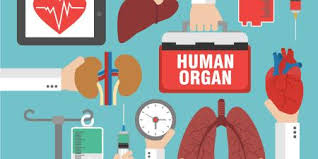Organ Transplant – Medical Science Notes – For W.B.C.S. Examination.
Organ transplants are, for a variety of reasons, more difficult to perform successfully than are most other grafts. Despite these difficulties, kidney transplant has become a routine operation in most developed countries. Heart and liver grafting have also become established, and promising results have been obtained with pancreas and combined heart–lung grafts.Continue Reading Organ Transplant – Medical Science Notes – For W.B.C.S. Examination.
The kidney
The surgery of kidney transplantation is straightforward, and the patient can be kept fit by dialysis with an artificial kidney before and after the operation. The kidney was the first organ to be transplanted successfully in humans, and experience is now considerable. Effective methods of preventing graft rejection have been available since the 1960s.
Fatal kidney disease is relatively common in young people. When there is deterioration of kidney function, eventually, despite all conventional treatment, the patient becomes extremely weak and anemic. Fluid collects in the tissues, producing swelling, known as edema, because the kidneys cannot remove excess water. Fluid in the lungs may cause difficulty in breathing and puts an excessive strain on the heart, which may already be suffering from the effects of high blood pressure as a result of kidney failure.
Waste products that cannot be removed from the body can cause inflammation of the coverings of the heart and the linings of the stomach and colon. As a result, there may be pain in the chest, inflammation of the stomach leading to distressing vomiting, and diarrhea from the colitis. The nerves running to the limbs may be damaged, resulting in paralysis. Treatment with the artificial kidney followed by kidney grafting can eliminate all these symptoms and has a good chance of permitting the dying person to return to a normal existence. Unfortunately, in most countries only a minority of patients receive this treatment because of a shortage of donor kidneys.
Artificial kidney treatment lasting about three to four hours, two to three times a week, removes all the features of kidney failure in one to two months. The patient then is able to leave the hospital and can be assessed as to suitability for a transplant. As has been mentioned, the kidney graft is heterotopic. The diseased kidneys are left in place, unless their continued presence is likely to impair the patient’s health after a successful graft.
Transplantation and postoperative care
The patient may receive a kidney from a live donor or a dead one. Cadaver kidneys may not function immediately after transplantation, and further treatment with the artificial kidney may be required for two to three weeks while damage in the transplanted kidney is repaired. The patient is given drugs that depress immune responses and prevent the graft from being rejected. Immediately after the operation, for the first week or two, every effort is made to keep the patient from contact with bacteria that might cause infection. The patient is usually nursed in a separate room, and doctors and nurses entering the room take care to wear masks and wash their hands before touching the patient. The air of the room is purified by filtration. Close relatives are allowed to visit the patient, but they are required to take the same precautions. When stitches have been removed, the patient is encouraged to get up as much as possible and to be active, but, in the first four months after the operation, careful surveillance is necessary to make sure that the patient is not rejecting the graft or developing an infection. The patient may be discharged from the hospital within a few weeks of the operation, but frequent return visits are necessary for medical examination and biochemical estimations of the blood constituents, to determine the state of function of the graft, and to make sure that the drugs are not causing side effects. Each patient requires a carefully adjusted dose of the immunosuppressive drugs that prevent transplant rejection.
Once the dosage of immunosuppressive drugs is stabilized, patients are encouraged to go back to a normal existence and return to work. The only restrictions are that they must continue to take their drugs and make frequent visits to the outpatient department for surveillance. Patients can return even to heavy work, such as driving a bulldozer, but more often a relatively light job is preferable. Women can bear children after a transplant, and men can become fathers. The course of events is not always so happy, unfortunately. If the patient rejects the kidney or develops a serious infection, it may be necessary to remove the graft and stop administration of the immunosuppressive drugs. The patient must then return to regular maintenance treatment with an artificial kidney but may receive a second or even a third graft.
Please subscribe here to get all future updates on this post/page/category/website


 +919674493673
+919674493673  mailus@wbcsmadeeasy.in
mailus@wbcsmadeeasy.in







































































































